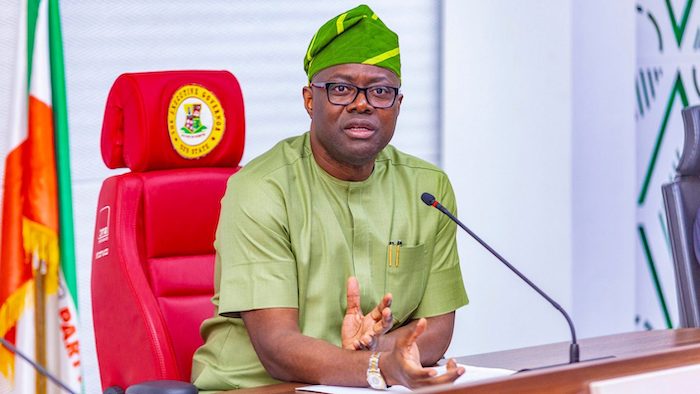The Federal Capital Territory (FCT) Abuja High Court has blocked Oyo State Government and agency payments in four banks.
The ex-chairmen and councillors led by Bashorun Majeed, Bosun Ajuwon, and Idris Okusesi filed a motion ex-parte for a garnishee order nisi. Justice A. O. Ebong issued the order.
First Bank, UBA, Wema Bank, and Zenith Bank are affected, according to NAN.
Justice Ebong ordered banks to explain why the order nisi should not be absolute.
On March 2, the judge ruled on FCT/HC/BW/M/238/2023, and a certified true copy (CTC) was seen in Abuja on Sunday.
According to court documents, the monies would cover the judgement debt owed by several former Local Government chairmen and councillors fired on May 29, 2019, by Gov. Seyi Makinde of Oyo State.
The chairmen and councillors’ counsel, Musibau Adetunbi, SAN, started the garnishee action to enforce the Supreme Court’s May 7, 2021 ruling against the governor and six others.
The ruling states: “A garnishee order nisi is hereby granted to attach the judgement debtors’ accounts with garnishees Nos. 1 to 4 in the motion ex-parte, for the purpose of settling the judgement debt outstanding in the sum of N3,374,889,425.60 as awarded by the Supreme Court and conceded by the judgement debtors in Exhibit 11 attached to the applicant’s motion.
“The garnishees (1st–4th) shall file affidavits and attend court on the next adjourned date to show cause why the order nisi should not be deemed absolute.
The judgement debtors must receive a copy of this order nisi by law. Continue this matter on 4/4/2023.”
The judgement creditors served copies of the order on the judgement debtors as ordered by the court.
The Oyo State Governor lists the Attorney General, Commissioner for Local Government and Chieftaincy Affairs, Accountant General, House of Assembly, Speaker, and Independent Electoral Commission as judgement debtors.
On March 12, 2018, OYSIEC elected ex-Chairmen and Councillors for three years.
After learning that Makinde, who took office on May 29, 2019, planned to fire them, the Chairmen and Councillors sued in the High Court of Oyo State to challenge the constitutionality of Sections 11 and 12 of the Oyo State Local Government Law 2001, which allowed the governor and House of Assembly to dissolve LG executives.
The Oyo State High Court deemed Sections 11 and 12 of the state’s Local Government Law 2001 unlawful on May 6, 2019, citing Section 7(1) of the Constitution.
Makinde fired the Chairmen and Councillors on May 29, 2019, despite the decision, and appealed.
On July 15, 2020, the Court of Appeal overturned the High Court’s judgement, which the Chairmen and Councillors appealed to the Supreme Court.
On May 7, 2021, Judge Kudirat Kekere-five-member Ekun’s top court panel approved the appeal dated SC/CV/556/2020 and overturned the Court of Appeal’s verdict.
The top court directed that the ex-Chairmen and Councillors, who were wrongfully terminated by the governor, be paid their salaries and allowances from May 29, 2019 to May 11, 2021, when their tenure should have finished. Makinde was fined N20 million.
The Supreme Court condemned Makinde’s undemocratic and arbitrary behaviour in Justice Ejembi Eko’s lead ruling.
“I will not conclude this appeal without commenting on the disturbing ugly face of impunity displayed by the Governor of Oyo State (1st respondent herein) on 29th May, 2019, tantamount to executive lawlessness, outrightly and vehemently condemned by this court in the case of the Military Governor of Lagos State v. Ojukwu,” Justice Eko said.
Makinde “issued imperial directives dissolving all democratically elected local Government Councils in Oyo State in violation of the subsisting judgement of Oyo State High Court in the suit No. 1/347/2017” on May 29, 2019, before appealing the High Court judgement.
“Series of motions were filed by the judgement creditors, the present appellants, to stop the 1st respondent (the Governor) from self-help meant to contemptuously thwart the High Court judgement.
He persisted. He continued to defy the Supreme Court’s verdict in his imperial omnipotence.
It is inconceivable that a democratically elected governor would engage in such undemocratic behaviour. These tendencies threaten democracy and law.
It is practically universal that democratically elected governors have become a species most destructive to democracy in this country.
“They disrespect and disrupt democratically elected Local Government Councils and appoint their lackeys as caretaker committee’s to administer business of Local Governments,” Justice Eko stated.
